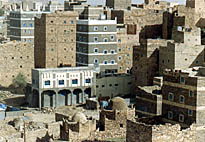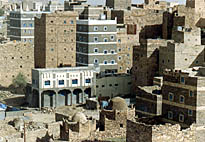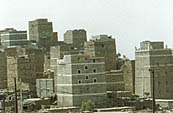
An Obituary for Folk Poet Shayef al-Khaledi [Archives:1999/04/Culture]
January 25 1999
News of great men travels. It was therefore no surprise to me that, while reading my email this week, I should learn of the death on December 31 of Yemeni folk poet Shayf al-Khaledi. But email is an unsympathetic medium, and hardly able to translate for me the loss and grief that hundreds of thousands of Yemenis — from shepherds in the most remote valleys of Lahej and Abyan to multi-millionaires in Jeddah, Paris, and New York — are feeling this month. Many English-speakers will not be familiar with the life and work of this extraordinary man. A brief introduction to al-Khaledi now, after his death, seems not too late given that his voice always had an uncanny ability to transcend its place and time.

He began contributing to local social and political affairs through poetry. In a region where, like many in Yemen, the settlement of controversy and disputes had long been managed through persuasive poems, al-Khaledi quickly distinguished himself as an eloquent and sagacious orator: an extremely valued member of a tribal society. He spent much of his youth traveling around Yafi`a to negotiate, learning much of his neighbors, his region, and its histories. His experience as a folk poet and mediator vastly expanded when he traveled to Aden for the first time in 1947. In working as a day-laborer in the port for three years, he saw first-hand the practices and consequences of colonialism for his fellow workers, most of whom were from the former Protectorate areas as well as Northern regions. It was during these years that he began formulating his ideas about nationalism, pan-Arabism and Yemen’s place in larger international contexts.
When the Revolution of 1962 broke out in the North, al-Khaledi abandoned his work in Aden and as a shepherd in Abyan in order to join forces against the Royalists. He spent four years fighting in the North, later returning to help drive the British out of Aden by 1967. These were powerful experiences for al-Khaledi that shaped and sharpened his ideas about Yemen and its people. As the national projects got underway in the PDRY and YAR respectively, al-Khaledi would become a national poet par excellence. By drawing from a rich tradition of symbolic expression that was profoundly moral and spiritual in outlook, he used his poems consistently to articulate national objectives from the perspective of the working majority: farmers, mechanics, small store-owners, taxi-cab drivers, as well as the makers and breakers of local politics. His language was colloquial, not the product of an elite education; yet for that reason his words were at once extremely rich and accessible to popular audiences. By drawing upon wonderful gestes of rural humor, folk wisdom, and local histories, he spoke powerfully about national issues: unity (for which he was a long-time supporter), the need to crack down on corruption and bribery (both by leadership cadres during the years of the PDRY and after unity), the hardships of economic reforms on the people (since southern regions had experienced enormous swings in economic
orientation), the centrality of religious life to good citizenship (including criticism of radical Islamist movements), and many other issues.

It was the audio-cassette that extended al-Khaledi’s prolific production and reputation to hundreds of thousands of listeners. While he had begun to use cassettes as early as the mid fifties, by the mid 1990s his poems were being distributed in huge quantities throughout Yemen as well as the Gulf and abroad. His poems have been sung especially by Yafi`i musicians and are set to the `oud (the well-known Middle Eastern lute) and sometimes a variety of drums, flutes and tambourines. But emphasis is given less to the music as much as his words. These words became especially relevant to listeners throughout Yemen when, thanks to the cassette, he was able to use poetic exchanges in order to establish a
national dialogue with poets from many different regions throughout Yemen.
While exchanges over the course of more than twenty years were sometimes hot and often political, he adhered to the tradition of mutual respect for other poets that has long marked the practice of poetry in Yemen and, might I add, the spirit of democracy that is so fundamental to the outlook of many Yemeni in both rural and urban areas. Cassettes enabled the extension of a lively genre of poetry that has long existed but which, through al-Khaledi’s leadership, developed a particularly popular orientation in recent years.
The remarkable thing about al-Khaledi was how extremely personable he was. Modest about his accomplishments, he was always quick to give credit to others, to sit with diverse groups of people and to encourage younger poets at every opportunity. His sociability and open-mindedness made my task all the easier. Working as an anthropologist for several years in Yemen, I was able to collect and translate many of his poems and complete a detailed history of his life just six months before he died. I remember my first impression of him at the local market in Lab`us, near his village in Yafi`a, where he paced around with a plastic sack in hand, bought the day’s groceries and supplies, chatted with others and swapped news as if the boundaries of the world were just over the hill. As I quickly discovered, the parochial image was deceiving. Everywhere he went in Yafi`a and `Aden people greeted him; delegations visiting from as far as Hadramawt, Sana`a and Ma’rib regularly sought him out, gave him the podium and devoured his poems; migrant communities in the Gulf, Britain and the United States were passionate about his poetry and the latest cassettes. Ironically, and most revealingly, he was relatively anonymous in official Yemeni media, academic institutions, and circles of the intellectual elite. His poetry, rather than couched in the elevated diction and conventional imagery of classical Arabic poetry, was sung in a familiar, colloquial tongue; his language, rather than replicating the discourses of those in circles of power, spoke to the concerns of popular Yemeni audiences. Ultimately, his poetry filled gaps and interpreted ruptures in political discourses, and for precisely that reason was remarkably mobile.
The last time I wa with al-Khaledi, we attended a rural wedding celebration together. We’d spent the previous evening with our eyes glued to the television set, watching France beat Brazil in the World Cup; he had been an avid observer through the final moments, late into the night, so I assumed that on the following night he would retire early. As dinner at the wedding was concluded and people gathered to dance, a poetic competition was set up.
Poets slowly gathered to compete extemporaneously, and soon al-Khaledi was in the center of a ring of challengers, each vying for an opportunity to produce a few perfectly measured and rhymed verses that could dislodge the “poet of ripostes” from his throne. The drums beat furiously, the dancers romped, and neither the tournament nor al-Khaledi showed any signs of abating by the time I crept exhausted into bed at two in the morning. I remember being amazed and relieved that al-Khaledi had the constitution to endure longer than a fit 30-year old. It is therefore with deep sorrow that, in writing an obituary, I reflect on how audiences young and old alike have been deprived of a man who had such a love for his country, a commitment to his neighbors, and a passion for poetry.
W. Flagg Miller
Department of Anthropology
University of Michigan
——
[archive-e:04-v:1999-y:1999-d:1999-01-25-p:./1999/iss04/culture.htm]


